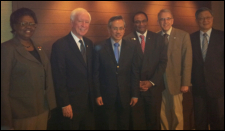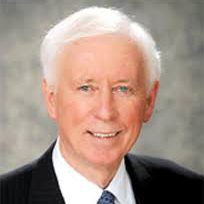WHO Geneva Sunday
I am in Geneva, Switzerland as part of the World Medical Association (WMA) delegation attending the Sixty-sixth World Health Assembly (WHA) of the World Health Organization (WHO). This annual meeting is an important one for the WMA in implementing its core mission of promoting the health and the well being of physicians and patients.

The WHO is the key focus of WMA’s external relations. The WHO recognizes only one category of formal relations known as “official relations”. In that role the WMA commits to supporting the policy and work of the WHO. At the same time the WMA seeks to advise and influence WHO’s work. This cooperation is very broad and covers all areas of medicine. Currently there is a strong focus on health systems development and strengthening and public health programs.
The WHA is the policy making body of WHO and its decisions are made by delegates from each of the 194 member countries led by their health ministers. As is the case with most large bodies of this kind much of the work is carried out by committees, which meet concurrently. In addition, individual one-on-one meetings between ministers facilitate the difficult work of arriving at agreements. Also a part of the mix are what are called “side events” that are educational sessions promoted by member countries and nongovernmental organizations (NGOs) such as the WMA, in which these groups seek to raise the level of visibility of specific health problems around the world.
This morning we were privileged to meet with the Taiwan health minister, Wen-ta Chiu and members of his delegation. We talked about public health issues of common interest to the WMA and Taiwan. Taiwan, Republic of China, has observer status in the WHO. Minister Chiu is a physician with a distinguished career that includes over 30 years of extensive research on brain trauma prevention and treatment. He has also been recognized for his contributions to public health in Taiwan as Minister of Health particular in relation to motorbike helmet laws.
Minister Chiu’s schedule for the WHA, impressive by any measure, includes private meetings with counterparts from 25 countries and speaking participation in 19 technical sessions. He reported that Taiwan is the only place outside mainline China to report a case of avian influenza (H7N9). The infected patient, a Taiwan businessman, had contracted H7N9 in China and is doing well. Minister Chiu reported positively on the level of cooperation between Taiwan and China. This week he will meet with the new Chinese Minister of Health, Li Bin, to discuss the outbreak of H7N9 and China’s restructuring of its health and family planning agencies.
This will mark the first time that health ministers from the two sides of the Taiwan Strait have met since both signed a bilateral health and medical cooperation agreement in 2010.
While at the WHA Minister Chiu plans to report on Taiwan’s health promotion achievements including lowering the children’s hepatitis B virus carrier rate from 10.6 percent to under 0.6 percent and progress made in liver transplant technology with five-year survival rates reaching 76 percent, one of the world’s highest.
Tomorrow I will report on an announcement here in Geneva by the World Health Professions Alliance (WHPA) of a major new statement on collaborative practice. The WHPA brings together the International Council of Nurses, the International Pharmaceutical Federation, the World Confederation for Physical Therapy, the World Dental Federation and the World Medical Association.

